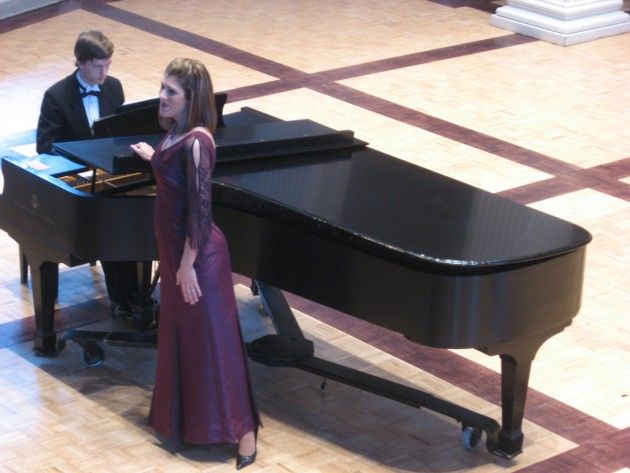Learning About Voice and Music Ziegler Performs and Educates in the Chapel
Meredith Ziegler walked up to the stage accompanied by the pianist, Stephen Scarlato, and a mystery violinist that no one announced. Ziegler, who incidentally teaches voice at the University of Connecticut, started the show giving us some background on the piece that she was about to perform. And then before every other piece, she would ingratiate us with the subject matter and the composer first.
That’s what set it apart from most of the other recitals I’ve been to. There was no inherent expectation from the audience to be an aesthetically aware and culturally muscular audience. She explained everything with a childlike panache, if that’s possible. For example, before a performance of Francis Poulenc’s Quatres Poemes de Guillaume Apollinaire, Ziegler brought up Poulenc’s love of surrealism, his obsessions with surrealist poets and poetry, his intense love for Paris and his dry sense of humor. And it was with an excitement that was brimming with respect that she announced that the piece was a commentary on all life itself.
Her performances alternated between joyous, uplifting, ominous, sad, morose, suspenseful, angry and comic with immensely eminent characterization from Ziegler herself. As she lost herself in each performance, it turned from a recital into what could very well have been a one-person opera.
Ziegler is a mezzo-soprano voice performer. She explained that she because she’s the lower of the sopranos, she primarily plays young men on stage. Even the first aria that she performed for us on Sunday was meant to be sung by the “prince.” This did surprise me, because Ziegler hit a couple of notes that were so high that I started wondering if those notes were even on a keyboard. Overall, her voice seamlessly negotiated every emotion that she tried to express and every melody that she used as her tool.
This voice attracted the attention of Director of Choral and Vocal Activities, Professor James Niblock, who teaches the Core class “The Human Voice” this semester. His entire class was in attendance at the recital. At the end of the performance, I got to have a couple of words with Professor Niblock. He explained to me that he mainly taught the anatomical and physiological aspects of how the human voice worked in the class, but that he wanted to show his students the artistic side of vocal expression. When I asked him what he took away from the recital and what he expected his class to take away from the recital, Niblock said that today his class got to experience the beautiful dynamism of the human voice. The physiological aspects of the voice lend colors to the fine art of expressing human emotion.
This concept of vocal colors struck true to what I took away from the recital. I honestly believe these programs should get more publicity. Lady Gaga fans, stand up and take note.
And honestly, we still don’t know who the mystery violinist was who played for the first three songs.






